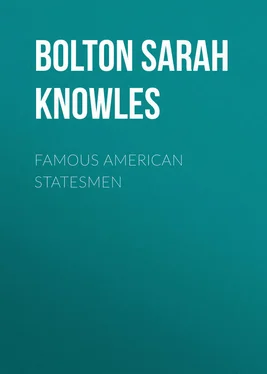Sarah Bolton - Famous American Statesmen
Здесь есть возможность читать онлайн «Sarah Bolton - Famous American Statesmen» — ознакомительный отрывок электронной книги совершенно бесплатно, а после прочтения отрывка купить полную версию. В некоторых случаях можно слушать аудио, скачать через торрент в формате fb2 и присутствует краткое содержание. ISBN: , Жанр: foreign_prose, foreign_antique, foreign_language, на английском языке. Описание произведения, (предисловие) а так же отзывы посетителей доступны на портале библиотеки ЛибКат.
- Название:Famous American Statesmen
- Автор:
- Жанр:
- Год:неизвестен
- ISBN:http://www.gutenberg.org/ebooks/39012
- Рейтинг книги:5 / 5. Голосов: 1
-
Избранное:Добавить в избранное
- Отзывы:
-
Ваша оценка:
- 100
- 1
- 2
- 3
- 4
- 5
Famous American Statesmen: краткое содержание, описание и аннотация
Предлагаем к чтению аннотацию, описание, краткое содержание или предисловие (зависит от того, что написал сам автор книги «Famous American Statesmen»). Если вы не нашли необходимую информацию о книге — напишите в комментариях, мы постараемся отыскать её.
Famous American Statesmen — читать онлайн ознакомительный отрывок
Ниже представлен текст книги, разбитый по страницам. Система сохранения места последней прочитанной страницы, позволяет с удобством читать онлайн бесплатно книгу «Famous American Statesmen», без необходимости каждый раз заново искать на чём Вы остановились. Поставьте закладку, и сможете в любой момент перейти на страницу, на которой закончили чтение.
Интервал:
Закладка:
The love of truth was a strong characteristic of Jefferson's nature, one of the most beautiful characteristics of any life. There is no other foundation-stone so strong and enduring on which to build a granite character as the granite rock of truth. Jefferson wrote to his children and nephews: "If you ever find yourself in any difficulty, and doubt how to extricate yourself, do what is right , and you will find it the easiest way of getting out of the difficulty… Give up money, give up fame, give up science, give the earth itself, and all it contains, rather than do an immoral act. And never suppose that, in any possible situation or any circumstances, it is best for you to do a dishonorable thing." Again he wrote: "Determine never to be idle. No person will have occasion to complain of the want of time, who never loses any. It is wonderful how much may be done if we are always doing."
After five years spent in France, most of which time he was minister plenipotentiary, Dr. Franklin having returned home, and John Adams having gone to England, Jefferson set sail for America, with his two beloved children, Martha, seventeen, and Mary, eleven. He had done his work well, and been honored for his wisdom and his peace-loving nature. Daniel Webster said of him: "No court in Europe had at that time a representative in Paris commanding or enjoying higher regard, for political knowledge or for general attainments, than the minister of this then infant republic."
Even before Jefferson reached home he had been appointed Secretary of State by President Washington. He accepted with a sense of dread, and his subsequent difficulties with Alexander Hamilton, Secretary of the Treasury, realized his worst fears. The one believed in centralization of power – a stronger national government; the other believed in a pure democracy – the will of the people, with the least possible governing power. The two men were opposite in character, opposite in financial plans, opposite in views of national polity. Jefferson took sides with the French, and Hamilton with the English in the French Revolution. The press grew bitter over these differences, and the noble heart of George Washington was troubled. Finally Jefferson resigned, and retired to Monticello. "I return to farming," he said, "with an ardor which I scarcely knew in my youth."
Three years later, he was again called into public life. As Washington declined a reëlection, John Adams and Thomas Jefferson became the two Presidential candidates. The one receiving the most votes of the electors became President, and the second on the list, Vice-President. John Adams received three more votes than Jefferson, and was made President.
On March 4, 1797, Jefferson, as Vice-President, became the leader of the Senate, delivering a short but able address. Much of the next four years he spent at Monticello, watching closely the progress of events. Matters with the French republic grew more complicated. She demanded an alliance with the United States against England, which was refused, and war became imminent. At the last moment, John Adams rose above the tempest of the hour, went quite half-way in bringing about a reconciliation, and the country was saved from a useless and disastrous war.
The Federalists had passed some unwise measures, such as the "Alien Law," whereby the President was authorized to send foreigners out of the country; and the "Sedition Law," which punished with fine and imprisonment freedom of speech and of the press. Therefore, at the next presidential election, when Adams and Jefferson were again candidates, the latter was made President of the United States, the Federalists having lost their power, and the Republicans – afterwards called Democrats – having gained the ascendancy.
The contest had been bitter. Jefferson's religious belief had been strongly assailed. Through it all he had the common-sense to know that the cool-headed, good-natured man, who has only words of kindness, and who rarely or never makes an enemy, is the man who wins in the end. He controlled himself, and therefore his party, in a manner almost unexampled.
March 4, 1801, at the age of fifty-eight, in a plain suit of clothes, the great leader of Democracy rode to the Capitol, hitched his horse to the fence, entered the Senate Chamber, and delivered his inaugural address. Thus simple was the man, who wished ever to be known as "the friend of the people." Alas! that sweet Martha Jefferson could not have lived to see this glad day! To what a proud height had come the hard-working college boy and the tender-hearted, tolerant man!
As President, he was the idol of his party, and, in the main, a wise leader. He made few removals from office, chiefly those appointed by John Adams just as he was leaving the Presidency. Jefferson said removals "must be as few as possible, done gradually, and bottomed on some malversation or inherent disqualification." One of the chief acts was the purchase from France of a great tract of land, called the Territory of Louisiana, for fifteen million dollars.
During his second four years in office, there were more perplexities. Aaron Burr, Vice-President during Jefferson's first term, was tried on the charge of raising an army to place himself on the throne of Mexico, or at the head of a South-western confederacy. England, usually at war with France, had issued orders prohibiting all trade with that country and her allies; Napoleon had retorted by a like measure. Both nations claimed the right to take seamen out of United States vessels. The British frigate Leopard took four seamen by force from the American frigate Chesapeake. The nation seemed on the verge of war, but it was postponed, only to come later, in 1812, under James Madison.
Congress passed the Embargo Act, by which all American vessels were detained in our own ports. It had strong advocates and strong opponents, but was repealed as soon as Jefferson retired from office. Owing to these measures our commerce was well-nigh destroyed.
At the age of sixty-five years, Jefferson retired to Monticello, "with a reputation and popularity," says Mr. Morse, "hardly inferior to that of Washington." He had had the wisdom never to assume the bearing of a leader. He had been careful to avoid disputes. Once, when riding, he met a stranger, with whom engaging in conversation, he found him bitterly opposed to the President. Upon being asked if he knew Mr. Jefferson personally, he replied, "No, nor do I wish to."
"But do you think it fair to repeat such stories about a man, and condemn one whom you do not dare to face?"
"I shall never shrink from meeting him if he ever comes in my way."
"Will you, then, go to his house to-morrow, and be introduced to him, if I promise to meet you there?"
"Yes, I will."
The stranger came, to his astonishment found that the man he had talked with was the President himself, dined with him, and became his firm friend and supporter ever afterward.
For the next seventeen years, Jefferson lived at Monticello, honored and visited by celebrities from all the world. Sometimes as many as fifty persons stayed at his home over night. One family of six came from abroad, and remained with him for ten months. His daughter Martha, married to Thomas Mann Randolph, presided over his hospitable home, and with her eleven children made the place a delight, for she had "the Jefferson temperament – all music and sunshine." The beautiful Mary, who married her cousin, John W. Eppes, had died at twenty-six, leaving two small children, who, like all the rest, found a home with Jefferson.
In the midst of this loving company, the great man led a busy life, carrying on an immense correspondence, by means of which he exerted a commanding influence on the questions of the day as well as on all social matters. To a child named for him, he wrote a letter which the boy might read after the statesman's death. In it are these helpful words: "Adore God. Reverence and cherish your parents. Love your neighbor as yourself. Be just. Be true. Murmur not at the ways of Providence."
Читать дальшеИнтервал:
Закладка:
Похожие книги на «Famous American Statesmen»
Представляем Вашему вниманию похожие книги на «Famous American Statesmen» списком для выбора. Мы отобрали схожую по названию и смыслу литературу в надежде предоставить читателям больше вариантов отыскать новые, интересные, ещё непрочитанные произведения.
Обсуждение, отзывы о книге «Famous American Statesmen» и просто собственные мнения читателей. Оставьте ваши комментарии, напишите, что Вы думаете о произведении, его смысле или главных героях. Укажите что конкретно понравилось, а что нет, и почему Вы так считаете.












